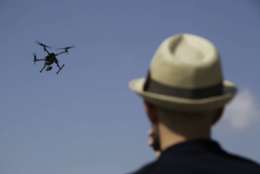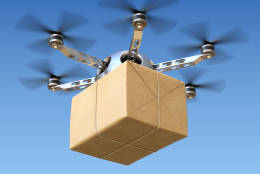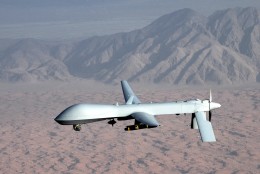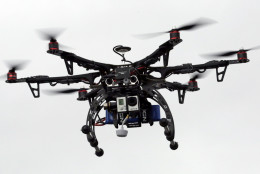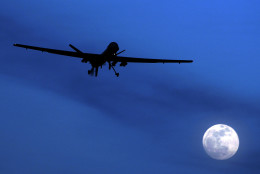drones
Texas Congressman Will Hurd, chairman of the Information Technology Subcommittee on Oversight and Government Reform, explains how his proposed Modernizing Government Technology Act could help solve the complex problem of IT in government. November 7, 2017
November 06, 2017-
FAA has moved painstakingly on drones. The Trump administration wants to speed things up.
October 27, 2017 -
Booz Allen Hamilton's Brian Abbe, Troy Abbot and Eric Billies join host Roger Waldron on this week's Off the Shelf to discuss the government's growing use of unmanned systems. October 3, 2017
October 01, 2017 -
Greensight Agronomics uses drone technology to survey agricultural land and reduce the use of chemicals, water, and labor.
June 01, 2017 -
Retired Blackhawk helicopter pilot Chrissie Engh brings her military experience to the private sector to educate the public on the regulations and capacities surrounding drone technology.
March 28, 2017 -
The U.S. Postal Service wants to jump on the drone delivery bandwagon, but the American people are not entirely sure about the idea just yet.
December 06, 2016 -
The Air Force said Wednesday that it would begin offering retention bonuses of up to $35,000 to entice its unmanned aircraft pilots to stay in the military as part of an ongoing “get-well” plan for a workforce that’s been stretched extremely thin.
August 11, 2016 -
The Defense Department plans to eventually buy nearly 2,000 F-35s. The FAA has registered some 500,000 drones.
August 03, 2016 -
The agency caught heat for how long it took to issue the rules. Now it's uncorked an industry ready to pop.
June 22, 2016 -
It has started already, but the next wave of innovation in unmanned technology will bring autonomy. That is, vehicles won't require human operators with a joystick flying them remotely.
May 10, 2016 -
Kelley Sayler, associate fellow at the Center for a New American Security, tells Pentagon Solutions drones work better in groups.
February 29, 2016 -
As both defensive and offensive platforms, unmanned aircraft have a lot more potential when working in groups known as swarms. It's something the Defense Advanced Research Projects Agency has been working on. Kelley Sayler, associate fellow and defense analyst at the Center for a New American Security, offers insight on Federal Drive with Tom Temin.
February 25, 2016 -
Fast-selling drones exemplify not so much new technology as the combination of existing products in such a way as to make new markets.
January 07, 2016 -
The DHS Privacy, Civil Rights and Civil Liberties Unmanned Aircraft Systems Working Group, which wrote the best practices, acknowledged that not all suggestions will apply to every agency.
January 04, 2016 -
Eight years after unmanned aircraft became a part of border security, the effectiveness of the program remains a question mark. A new Homeland Security inspector general audit says Customs and Border Protection never developed performance measures. Investigators found aircraft don't meet flight goals, and CBP has way undercalculated flight costs. The agency, however, disputes those findings. For the management side of the story, Randolph "Tex" Alles, assistant commissioner of the Office of Air and Marine at CBP, joined Tom Temin on the Federal Drive. His first bone to pick concerned how long the drones are supposed to be in the air.
February 02, 2015

